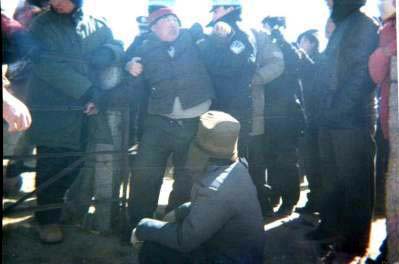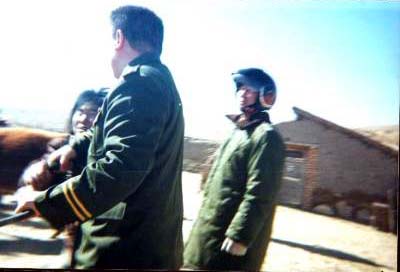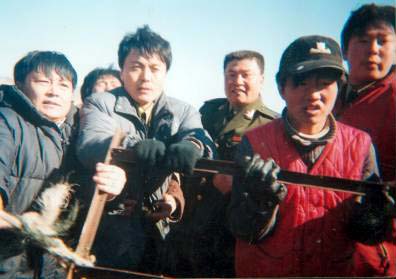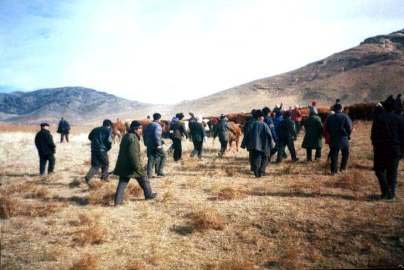|
<Back>
A Complaint By Bayan-Khan Township’s Zuun
Khar Mod Gachaa and Khoroochin Gachaa’s Herders in Bagarin
Rights Banner

Many ethnic Mongolian herders
were beaten up and arrested
by the police during the
displacement in eastern
Inner Mongolia’s Bagarin Right
Banner.

Mongolian herders who resisted the coerced displacement have
been treated brutally by the police in Inner Mongolia.

Infrastructure for livestock husbandry has been dismantled by
the
police if the ethnic Mongolian herders did not want to give up
their traditional nomadic lifestyle.

During the forced relocations,
the authorities have confiscated ethnic
Mongolian herders’ livestock
and other property in the pretext
of “recovering the grassland
eco-system”.
Comment: A scholar pointed out that northern
China’s sandstorms are retribution from the elimination of
ethnic Mongolian traditional nomadic life-style. Since the
90’s, a series of related laws and policies have been adopted
by the country as a result of the recognition of the
importance of environmental protection and ecological
development. However, during the implementation process of the
laws and policies, many unscientific and impractical
propositions violating the laws of nature, such as “raising
livestock in a pen”, “sealing hills and pasture” and
“extinguish the ‘chief culprit’ of grassland destruction
--goats” etc, have been pursued but predictably have led to
disastrous results. The situation referenced in this complaint
is not the only such case in the region. It is happening
everywhere in Inner Mongolia and herders are appealing to
higher authorities for help. We hope the authorities and
experts will pay close attention to it.
In May 2001, the People’s Government of Bagarin
Right Banner issued Document No.64. The main objective of the
document was to prohibit local herders from livestock-grazing
in an area of nearly 40,000 hectares grassland near the
Daban-Bagarin Bridge Traffic Way effective June 1, 2001 and to
forcibly move the local herders from the area in a very short
period of time. The authorities not only ordered fines of 100
Yuan for each horse or cow, 20—50 Yuan for each sheep or goat
but also organized a 35 member group called the “Grassland
Administration Station” comprised of policemen and
governmental cadres who have brutally treated local herders.
This has aroused the local herders’ anger and increased
tensions between herders and the government. This is an appeal
to the higher authorities by more than 200 herders from Khar-Mod
Gachaa and Khoroochin Gachaa whose entire populations have
become the targets of the forced eviction:
1. This arbitrary deprivation of local
herders’ rights to owning their pasture land and the forced
evictions have violated the State Grassland Act, Villagers’
Committee Organizational Act, Land Management Act and the Land
Contractual Management Act which clearly stipulated that land
management rights will not be changed for 30-50 years.
2. The Banner Government’s decision to create
a “Livestock Prohibition Area“ is not only unscientific and
impractical but also illegal. The area is our native land
where we have lived for generations. Since the Cooperative
Economy and the People’s Commune era, during 1997’s land
management reform, in accordance with the “Grassland
Contractual Management Certificate Act“ and the “Grassland Use
Certificate Act“, we have invested large amounts of capital
and labor into protecting our grassland’s ecosystem. As a
result, the Gachaas’ average personal income has reached the
Banner’s average personal income. For example, Mr. Altanochir,
a herder from Horoochin Gachaa, along with six others, has
developed the “Two Complete Contractual Management Based
Grassland Infrastructure Development Project” which has been
highly praised by all levels of government and the
agricultural-husbandry authorities. All these painstaking
efforts directed towards local environmental development and
pasture land contractual use have been ignored by the
government’s so-called “Prohibition On Livestock-Grazing”.
Now, our government is forcing us to leave our homeland. The
government and its bureaucracy must have some other purpose in
mind. We know some of our government officials have carried
out the duties of their office in name only and consequently,
a nearly 1 million Yuan financial deficit has been created
from making a series of so-called “Learning From Others”
international and domestic trips. We believe that the
“Prohibition On Livestock-Grazing“ is just a pretext for some
other purpose. This is undisguised plundering!
3. Setting up “Livestock-Grazing Prohibition
Areas” does not make any sense. It has not only left the
usable land unused but also increased the density of both
herders and livestock population in the new area where the
herders have been resettled to. Therefore, this has made the
grassland more unbalanced.
4. The Banner government has seriously
violated herders’ rights during the implementation:
A), Repairing roads is of course a good
thing. However, during the process of road repairs, the
government did not requisition the land from the local people.
Second, the grasslands suffered damage from improper water
drainage and no compensation was provided for this damage.
Third, a so-called “ Traffic Way Protection Area” was
arbitrarily set up expropriating a large area of contracted
land 600 meters wide from both sides of the highway.
B),
This immigration policy is not consistent
with the law. Ignoring local herders’ investments in
environmental protection infrastructure, the government has
arbitrarily ordered that every family must be allocated a
two-room brick house with a livestock fence by paying 5,000
Yuans. We cannot accept this kind of unjust emigration policy.
For example, Zuun Khar-Mod Gachaa, one of the victims of this
policy, has 101 households, a population of 422 and more than
10,000 livestock. There were 6 large well-preserved grasslands
whose total area is 80,000 Mu, 78 small well-preserved
grasslands, 88 green houses, 13 wells, 20,000 Mu
desert-controlling greenbelt and a Gachaa-established
elementary school in our 126,000 Mu land. We have invested 9,4
million Yuans for this infrastructure. However, under the
higher authority’s policy, since the first relocation of 33
households with 86 individuals, the relocated herders have not
been given any economic assistance. In their new location,
because of increasing huge expenses, all of the herders have
been led to total bankruptcy. They are complaining about the
government’s brutal treatment and hoping to return to their
homeland.
C),
The forced relocation has brought the local
herders enormous economic losses. In order to move by a very
close deadline, we had to break down our infrastructures and
sell our livestock at very low prices. Because of the shortage
of facilities and other infrastructure, it is extremely hard
to make a living in the new place.
5. The Banner Government has seriously
violated local herders’ basic civil rights. Since the
establishment of the “Grassland Administration Station”,
livestock have been brutally treated and driven away, herders
have been threatened and fined. On one occasion, the
government used as many as ten or so police cars, 20-some
police motorcycles and nearly a hundred policemen and security
persons to fight with bare-handed herders. Livestock have been
driven away more than 30 times, 41 livestock have been
plundered, 4 people have been beaten up and seriously injured,
2 old herders had fallen into a coma when the policemen
intruded into their place to plunder their livestock. Not only
the herders’ normal daily life have been seriously interfered
with but also they have been arbitrarily fined 4,000 Yuan.
This has brought the herders serious economic and mental
stress. We urge the Banner Government to revoke Document No.64
and lift the “Prohibition On Livestock-Grazing” to let us live
in our native land. We have enough confidence and knowledge to
build up our homeland by our own means. We hope the related
authorities and government officials will give full
consideration to our appeal.
Herdsman Hugjiltu from Zuun Khar-Mod Gachaa
Herdsman Altanochir from Khoroochin Gachaa and
others
March 15, 2002
<Back>
|





